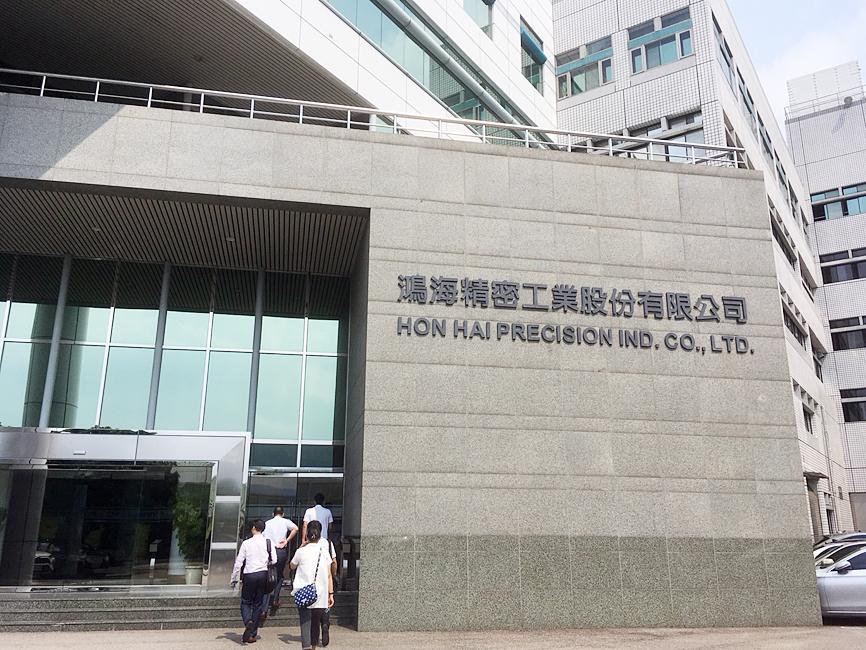Hon Hai Precision Industry Co (鴻海精密), an iPhone assembler, has benefited from solid demand for Apple Inc’s latest smartphones and other gadgets such as high-end servers, reporting a monthly sales increase of more than 4 percent last month.
Largan Precision Co (大立光), a supplier of Apple’s smartphone camera lenses, also saw a jump in its sales last month, which rose 13 percent month-on-month.
Hon Hai, the world’s largest contract electronics maker, said in a statement on Thursday that it posted NT$418.02 billion (US$15.03 billion) in consolidated sales last month, up 4.08 percent month-on-month and 3.64 percent year-on-year.

Photo: Chen Jou-chen, Taipei Times
The company’s sales were driven by solid demand for Apple’s iPhone 12 Pro and Pro Max, as well as for servers, notebook computers and equipment for 5G base stations, analysts said.
The strong sales indicated that Hon Hai’s operations in the Chinese city of Zhengzhou were not affected by severe flooding that began on July 16, analysts said.
The Zhengzhou plant, Hon Hai’s second-largest factory in China, employs 250,000 people who assemble 500,000 iPhones per day, accounting for about 50 percent of global iPhone production, Chinese media reported.
Among Hon Hai’s various divisions, its consumer electronics business posted the best year-on-year sales growth last month, followed by electronic components, computer products and cloud technology-based gadgets, the company said.
On a monthly basis, the electronic components division reported the highest sales growth, ahead of computer products, cloud technology-based gadgets and consumer electronics, Hon Hai said.
Hon Hai’s consolidated sales in the first seven months of the year totaled NT$3.12 trillion, up 26.69 percent from a year earlier.
Largan on Thursday said that its consolidated sales last month rose by 13 percent month-on-month to NT$3.8 billion, marking the second consecutive month of growth.
However, that represented an 18 percent decline from a year earlier, which analysts attributed to a loss of orders from one of its major clients, Huawei Technologies Co (華為), due to sanctions imposed on the Chinese company by the US in September last year.
Largan has forecast a continued monthly increase in sales this month, saying that a shortage of chips has eased to some extent, but a shortage of other raw materials remains.
Lenses of 20 megapixels and more, which have a higher profit margin, accounted for 10 to 20 percent of Largan’s total sales last month, while 10 to 20 megapixel lenses accounted for 40 to 50 percent, and 8 to 10 megapixel lenses comprised 10 percent, Largan said.
Largan’s consolidated sales in the first seven months of the year fell 16 percent year-on-year to NT$25.74 billion.

China’s Huawei Technologies Co (華為) plans to start mass-producing its most advanced artificial intelligence (AI) chip in the first quarter of next year, even as it struggles to make enough chips due to US restrictions, two people familiar with the matter said. The telecoms conglomerate has sent samples of the Ascend 910C — its newest chip, meant to rival those made by US chipmaker Nvidia Corp — to some technology firms and started taking orders, the sources told Reuters. The 910C is being made by top Chinese contract chipmaker Semiconductor Manufacturing International Corp (SMIC, 中芯) on its N+2 process, but a lack

TECH BOOST: New TSMC wafer fabs in Arizona are to dramatically improve US advanced chip production, a report by market research firm TrendForce said With Taiwan Semiconductor Manufacturing Co (TSMC, 台積電) pouring large funds into Arizona, the US is expected to see an improvement in its status to become the second-largest maker of advanced semiconductors in 2027, Taipei-based market researcher TrendForce Corp (集邦科技) said in a report last week. TrendForce estimates the US would account for a 21 percent share in the global advanced integrated circuit (IC) production market by 2027, sharply up from the current 9 percent, as TSMC is investing US$65 billion to build three wafer fabs in Arizona, the report said. TrendForce defined the advanced chipmaking processes as the 7-nanometer process or more

NVIDIA PLATFORM: Hon Hai’s Mexican facility is to begin production early next year and a Taiwan site is to enter production next month, Nvidia wrote on its blog Hon Hai Precision Industry Co (鴻海精密), the world’s biggest electronics manufacturer, yesterday said it is expanding production capacity of artificial intelligence (AI) servers based on Nvidia Corp’s Blackwell chips in Taiwan, the US and Mexico to cope with rising demand. Hon Hai’s new AI-enabled factories are to use Nvidia’s Omnivores platform to create 3D digital twins to plan and simulate automated production lines at a factory in Hsinchu, the company said in a statement. Nvidia’s Omnivores platform is for developing industrial AI simulation applications and helps bring facilities online faster. Hon Hai’s Mexican facility is to begin production early next year and the

Who would not want a social media audience that grows without new content? During the three years she paused production of her short do-it-yourself (DIY) farmer’s lifestyle videos, Chinese vlogger Li Ziqi (李子柒), 34, has seen her YouTube subscribers increase to 20.2 million from about 14 million. While YouTube is banned in China, her fan base there — although not the size of YouTube’s MrBeast, who has 330 million subscribers — is close to 100 million across the country’s social media platforms Douyin (抖音), Sina Weibo (新浪微博) and Xiaohongshu (小紅書). When Li finally released new videos last week — ending what has